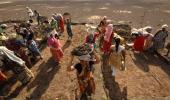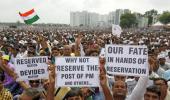A BJP source admitted that a census will inevitably reconfirm the numerical majority of the OBCs. 'That will overturn social equations and consign the upper castes to a twilight zone of marginalisation. The RSS won't accept it.'
Radhika Ramaseshan reports.

On August 11, nearly a month after Prime Minister Narendra Modi expanded his ministerial council, the Bharatiya Janata Party's front organisation representing the Other Backward Classes or OBCs felicitated the 27 OBC ministers at a special function hosted at Delhi's Ambedkar International Centre.
The BJP considered their induction a "breakthrough" moment in its history because the OBCs constitute 35 per cent of Modi's council of ministers, signifying the importance that the communities hold in its political scheme.
"It was an emotional moment for us," said Dr K Laxman, who heads the OBC Morcha. The perception of the BJP being an "urban, upper caste" party was long since dispelled and the OBC scaffolding encasing its architecture is expected to be fortified in the coming years.
However, the best-laid plans hit a wall, and for the BJP, the demand to hold a caste census might adversely impact the pro-OBC agenda. It entails visiting one of the most contested sites of memory and history which remained shrouded behind a veil of denial until 1989, before the Mandal Commission recommended a reservation quota for the OBCs in educational institutions and jobs.
Academic Satish Deshpande explained why this was so, in an article 'The OBC Primer on Indian Politics' (Forward Press magazine, 2016).
"When only the SCs and STs were being counted, the upper castes were able to travel incognito with the OBCs as part of a 'general category', accounting for three-quarters of the population. Once the OBCs acquired a distinct national identity after the Mandal revolution, the 'public secret' of Indian politics stood revealed -- namely, that the Hindu upper castes, numbering no more than 15-20 per cent of the population, were undoubtedly our most powerful and pampered minority," Dr Laxman said.
Not surprisingly, the loudest and most persistent voices for a caste census came from the OBCs in the political spectrum. In the just-concluded monsoon session of Parliament, when the Constitution (127th) Amendment bill that sought to restore the power of the states to list their OBCs was debated in the Lok Sabha, two women, both from Uttar Pradesh and belonging to the backward castes, rooted strongly for the census.
Badaun MP Sanghamitra Maurya was scathing. "We know how many cattle are in each district and the number of animals in the districts. But backward castes have never been counted. People of our castes, classes and society become the focus only ahead of the elections."
Mirzapur MP and junior minister Anupriya Patel said, "The concept of social justice will remain incomplete till backward and oppressed castes get proportional representation in all pillars of democracy."
In response to a question, the Centre stated its position. "The Government of India has decided as a matter of policy to not enumerate caste-wise population other than SCs and STs in census," said Nityanand Rao, the junior home minister.
The census issue has now become inextricably tied to the conduct of an accurate and transparent counting of the OBCs population, the absence of which led to an "inadequate" representation of the backward castes in government jobs and educational institutions, according to political leaders.
The Mandal Commission used the statistics of the 1931 census (the last caste-wise enumeration), backed by other data and extrapolations to arrive at a figure of 52 per cent OBC population and a proposal to earmark 27 per cent quotas, which the committee noted was far below their numbers.
Thereafter, the Socio-Economic Caste Census (SECC) was carried out between 2011 and 2013 as part of the rural development ministry's survey of the socio-economic status of households. The SECC's caste-related findings were concealed but it was believed it listed 46 lakh castes and sub-castes that would have made their categorisation a humungous task.
The BJP's Laxman alleged that the SECC had turned the clock back on OBC enumeration.
"The BJP is in favour of it but look at the technical and legal problems that the SECC's unscientific methodology created. A census may reveal that instead of 46 lakh, there are 30,000 to 40,000 castes. But this will lead to complications because there will be enough to say it's a conspiracy to leave out millions."
A senior BJP leader's cautious take was, "There are pluses and minuses. Will caste enumeration sharpen identities? Is it practical?"
The Rashtriya Swayamsevak Sangh spoke in two voices, one ostensibly for public consumption and a guarded private assessment. Dattatreya Hosabale, the Sangh's general secretary, stressed at a recent book launch that the organisation was a "staunch supporter" of reservations. "Reservations should continue as long as inequality is experienced by a particular section of society," he said.
Hosabale repudiated his predecessor Suresh "Bhaiya" Joshi's stance. Joshi argued against a caste census because he thought it would "go against" the notion of a casteless society envisaged by Dr BR Ambedkar and weaken the RSS's social harmony project.
A Sangh source averred that the organisation would not have green-lighted the caste census. "The question then, is it meant to address caste issues or strengthen OBC identities?" he asked, pointing out that in Maharashtra, the OBC issue had irrecoverably fragmented society.
"The Marathas and Kunbis were one conglomerate. By dividing them, you have pitted one against the other because the Marathas are an intermediate caste and the Kunbis, a backward caste. The basic idea of a census should be to yield data to formulate policies and not tear society apart," the source said.
A BJP source admitted that a census will inevitably reconfirm the numerical majority of the OBCs. "That will overturn social equations and consign the upper castes to a twilight zone of marginalisation. The RSS won't accept it."











